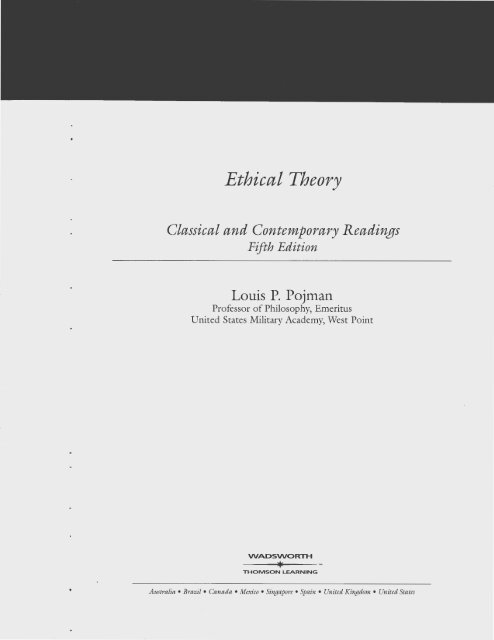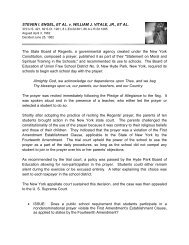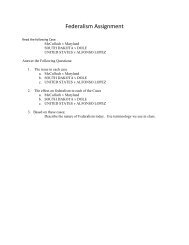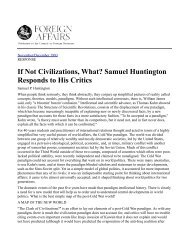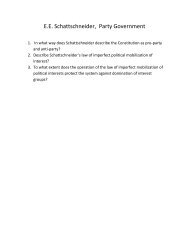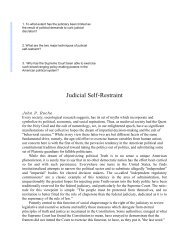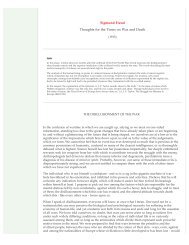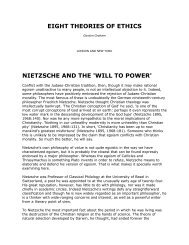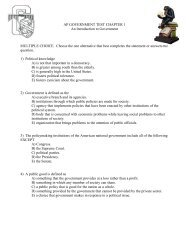Page 1 g: www. N O I `T I` D E H T `F. F LOUIS P. POJMAN Page 2 ...
Page 1 g: www. N O I `T I` D E H T `F. F LOUIS P. POJMAN Page 2 ...
Page 1 g: www. N O I `T I` D E H T `F. F LOUIS P. POJMAN Page 2 ...
You also want an ePaper? Increase the reach of your titles
YUMPU automatically turns print PDFs into web optimized ePapers that Google loves.
•<br />
Ethical Theory<br />
Classical and Contemporary Readings<br />
Fifth Edition<br />
Louis P. Pojman<br />
Professor of Philosophy, Emeritus<br />
United States Military Academy, West Point<br />
VVADSVVORTH<br />
-<br />
THOMSON LEARNING<br />
Australia • Brazil • Canada • Mexico • Singapore • Spain • United Kingdom • United States
WADSWORTH<br />
THOMSON LEARNING<br />
Publisher: Holly J. Allen<br />
Philosophy Editor: Steve Wainwright<br />
Assistant Editors: Lee McCracken, Barbara Hillaker<br />
Editorial Assistant: Gina Kessler<br />
Technology Project Manager: Julie Aguilar<br />
Marketing Manager: Worth Hawes<br />
Marketing Assistant: Alexandra Tran<br />
Marketing Communications Manager: Stacey Purviance<br />
Creative Director: Rob Hugel<br />
Executive Art Director: Maria Epes<br />
© 2007 Thomson Wadsworth, a part of The Thomson<br />
Corporation. Thomson, the Star logo, and Wadsworth are<br />
trademarks used herein under license.<br />
ALL RJGHTS RESERVED. No part of this work covered<br />
by the copyright hereon may be reproduced or used in any<br />
form or by any means-graphic, electronic, or mechanical,<br />
including photocopying, recording, taping, web distribution,<br />
information storage and retrieval systems, or in any<br />
other manner-without the written permission of the pub<br />
Lisher.<br />
Printed in the United States of America<br />
2 3 4 5 6 7 09 08 07<br />
Print Buyer: Karen Hunt<br />
Permissions Editor: Kiely Sisk<br />
Production Service: Ruth Cottrell<br />
Copy Editor: Ruth Cottrell<br />
Cover Designer: Hatty Lee<br />
Cover Image: © M. Angelo / CORBIS<br />
Compositor: International Typesetting and Composition<br />
Cover Printer: Coral Graphic Services<br />
Text Printer: Maple-Vail Manufacturing Group<br />
@Binghamton<br />
Thomson Higher Education<br />
l 0 Davis Drive<br />
Belmont, CA 94002-3098<br />
USA<br />
For more information about our products, contact us at:<br />
Thomson Learning Academic Resource Center<br />
l -800-423-0563<br />
For permission to u5
52 Part II Ethical Relativism versus Ethical Objectivism<br />
I<br />
I<br />
II.S Moral Relativism Defended<br />
GILBERT HARMAN<br />
Gilbert Harman is a professor of philosophy at Princeton University and has<br />
done important work in epistemology, action theory, and ethics. In this essay<br />
Hannan attempts to reconstruct ethical relativism. It is contractual, internalist,<br />
and relativistic. It is contractual, for according to this position morality<br />
arises from agreements between people about their relations to each other. It<br />
is a form of politics in that it originates in an implicitly bargaining situation<br />
in which various parties decide what are tl1e basic wants that they have in<br />
common. Ethical relativism proceeds from tlus notion of agreement. All<br />
moral judgments about someone's actions make sense only in relation to<br />
some agreement that the agent has explicitly or implicitly made, so the<br />
defining feature is relative to the agreement and not in any independent<br />
norm. Harman's position is internalist, for it claims that moral judgments<br />
do not apply to agents unless tl1ey have motivating reasons for their actions.<br />
These motivating reasons arise in the social agreements they make. Finally,<br />
Harman argues tlut his theory fits in better witl1 our moral intuitions than<br />
objectivist tl1eories and has greater explanatory power.<br />
My thesis is that morality arises when a group of<br />
people reach an implicit agreement or come to a<br />
tacit understanding about their relations with one<br />
anotl1er. Part of what I mean by this is that moral<br />
judgments-or, rather, an important class of<br />
them-make sense only in relation to and with<br />
reference to one or another such agreement or<br />
understanding. This is vague, and I shall try to<br />
make it more precise in what follows. But it<br />
should be clear that I intend to argue for a version<br />
of what has been called moral relativism.<br />
In doing so, I am taking sides in an ancient<br />
controversy. Many people have supposed that the<br />
sort of view which I am going to defend is obviously<br />
correct-indeed, that it is the only sort of<br />
account that could make sense of the phenomenon<br />
of morality. At the same time there have also<br />
been many who have supposed that moral relativism<br />
is confused, incoherent, and even immoral,<br />
at the very least obviously wrong.<br />
Reprinted with Permission from Philsophical Review 84<br />
(1975): 3- 22.<br />
Most arguments against relativism make use<br />
of a strategy of dissuasive definition; they define<br />
moral relativism as an inconsistent thesis. For<br />
example, they define it as the assertion that (a)<br />
there are no universal moral principles and (b) one<br />
ought to act in accordance with the principles of<br />
one's own group, where this latter principle, (b) is<br />
supposed to be a universal moral principle.l It is<br />
easy enough to show that this version of moral<br />
relativism will not do, but that is no reason to<br />
think that a defender of moral relativism cannot<br />
find a better definition.<br />
My moral relativism is a soberly logical thesis-a<br />
thesis about logical form, if you like. Just as<br />
the judgment that something is large makes sense<br />
only in relation to one or another comparison<br />
class, so too, I will argue, the judgment that it is<br />
wrong of someone to do something makes sense<br />
only in relation to an agreement or understanding.<br />
A dog may be large in relation to chihuahuas but<br />
not large in relation to dogs in general. Similarly,<br />
I will argue, an action may be wrong in relation to<br />
one agreement but not in relation to another. Just<br />
as it makes no sense to ask whether a dog is large,<br />
We makt:<br />
we supp<br />
by the re<br />
pose are n<br />
judgment<br />
someone<br />
or that sc rr<br />
something.<br />
ments in \\
II.S Harman: Moral Relati11ism Defended 53<br />
make use<br />
ey define<br />
esis. For<br />
'1 that (a)<br />
nd (b) one<br />
nciples of<br />
1ple, (b) is<br />
ple 1 It is<br />
of moral<br />
reason to<br />
m cannot<br />
gical the<br />
IKe. Just as<br />
akes sense<br />
-omparison<br />
rtt that it is<br />
akes sense<br />
erstanding.<br />
uahuas but<br />
. Similarly,<br />
relation to<br />
lother. Just<br />
)g is large,<br />
period, apart from any relation to a comparison<br />
class, so too, I will argue, it makes no sense to ask<br />
whether an action is wrong, period, apart from any<br />
relation to an agreement.<br />
There is an agreement, in the relevant sense, if<br />
each of a number of people intends to adhere to<br />
some schedule, plan, or set of principles, intending<br />
to do this on the understanding that the others<br />
similarly intend. The agreement or understanding<br />
need not be conscious or explicit; and I will not<br />
here try to say what distinguishes moral agreements<br />
from, for example, conventions of the road<br />
or conventions of etiquette, since these distinctions<br />
will not be important as regards the purely<br />
logical thesis that I will be defending.<br />
Although I want to say that certain moral judgments<br />
are made in relation to an agreement, I do not<br />
want to say this about all moral judgments. Perhaps<br />
it is true that all moral judgments are made in relation<br />
to an agreement; nevertheless, that is not what<br />
I will be arguing. For I want to say that there is a way<br />
in which certain moral judgments are relative to an<br />
agreement but other moral judgments are not. My<br />
relativism is a thesis only about what I will call "i1mer<br />
judgments," such as the judgment that someone<br />
ought not to have acted in a certain way or the judgment<br />
that it was right or wrong of him to have done<br />
so. My relativism is not meant to apply, for example,<br />
to the judgment that someone is evil or the judgment<br />
that a given institution is tmjust.<br />
In particular, I am not denying (nor am I<br />
asserting) that some moralities are "objectively"<br />
better than others or that there are objective standards<br />
for assessing moralities. My thesis is a soberly<br />
logical thesis about logical form.<br />
I. Inner Judgments<br />
We make inner judgments about a person only if<br />
we suppose that he is capable of being motivated<br />
by the relevant moral considerations. We make<br />
other sorts of judgments about those who we suppose<br />
are not susceptible of such motivation. Inner<br />
judgments include judgments in which we say that<br />
someone should or ought to have done something<br />
or that someone was right or wrong to have done<br />
something. Inner judgments do not include judgments<br />
in which we call someone (literally) a savage<br />
or say that someone is (literally) inhuman, evil, a<br />
betrayer, a traitor, or an enemy.<br />
Consider this example. Intelligent beings from<br />
outer space land on Earth, beings without the<br />
slightest concern for human life and happiness.<br />
That a certain course of action on their part might<br />
injure one of us means nothing to them; that fact<br />
by itself gives them no reason to avoid the action.<br />
In such a case it would be odd to say that nevertheless<br />
the beings ought to avoid injuring us or<br />
that it would be wrong for them to attack us. Of<br />
course we will want to resist them if they do such<br />
things and we will make negative judgments about<br />
them; but we will judge that they are dreadful enemies<br />
to be repelled and even destroyed, not that<br />
they should not act as they do.<br />
Similarly, if we learn that a band of cannibals<br />
has captured and eaten the sole survivor of a shipwreck,<br />
we will speal< of the primitive morality of the<br />
cannibals and may call them savages, but we will not<br />
say that they ought not to have eaten their captive.<br />
Again, suppose that a contented employee of<br />
Murder, Incorporated was raised as a child to<br />
honor and respect members of the "family" but to<br />
have nothing but contempt for the rest of society.<br />
His current assignment, let us suppose, is to kill a<br />
certain bank manager, Bernard J. Ortcutt. Since<br />
Ortcutt is not a member of the "family," the<br />
employee in question has no compunction about<br />
canying out his assignment. In particular, if we<br />
were to try to convince him that he should not kill<br />
Ortcutt, our argument would merely amuse him.<br />
We would not provide him with the slightest reason<br />
to desist unless we were to point to practical<br />
difficulties, such as the likelihood of his getting<br />
caught. Now, in this case it would be a misuse of<br />
language to say of him that he ought not to kill<br />
Ortcutt or that it would be wrong of him to do so,<br />
since that would imply that our own moral considerations<br />
carry some weight with him, which they<br />
do not. Instead we can only judge that he is a criminal,<br />
someone to be hunted down by the police, an<br />
enemy of peace-loving citizens, and so forth.<br />
It is true that we can make certain judgments<br />
about him using the word "ought." For example,<br />
investigators who have been tipped off by an<br />
informer and who are waiting for the assassin to<br />
appear at the bank can use the "ought" of expectation<br />
to say, "He ought to arrive soon," meaning<br />
that on the basis of their information one would
54 Part II Ethical Relativism verstts Ethical Objectivism<br />
expect him to arrive soon. And, in thinking over<br />
how the assassin might carry out his assignment,<br />
we can use the "ought" of rationality to say that he<br />
ought to go in by the rear door, meaning that it<br />
would be more rational for him to do that than to<br />
go in by the front door. In neither of these cases is<br />
the moral "ought" in question.<br />
There is another use of "ought" which is normative<br />
and in a sense moral but which is distinct<br />
from what I am calling the moral "ought." This is<br />
the use which occurs when we say that something<br />
ought or ought not to be the case. It ought not to<br />
be the case that members of Murder, Incorporated<br />
go around killing people; in other words, it is a<br />
terrible thing that they do so.2 The same thought<br />
can perhaps be expressed as "They ought not to<br />
go around killing people," meaning that it ought<br />
not to be the case that they do, not that they are<br />
wrong to do what they do. The normative "ought<br />
to be" is used to assess a situation; the moral<br />
"ought to do" is used to describe a relation<br />
between an agent and a type of act that he might<br />
perform or has performed.<br />
The sentence "They ought not to go around<br />
killing people" is therefore multiply ambiguous. It<br />
can mean that one would not expect them to do so<br />
(the "ought" of expectation), that it is not in their<br />
interest to do so (the "ought" of rationality), that it<br />
is a bad thing that they do so (the nonnative "ought<br />
to be"), or that they are wrong to do so (the moral<br />
"ought to do."). For the most part I am here concerned<br />
only with the last of these interpretations.<br />
The word "should" behaves very much like<br />
"ought to." There is a "should" of expectation<br />
("They should be here soon"), a "should" of<br />
rationality ("He should go in by the back door"),<br />
a normative "should be" ("They shouldn't go<br />
around killing people like that"), and the moral<br />
"should do" ("You should keep that promise"). I<br />
am of course concerned mainly with the last sense<br />
of "should."<br />
"Right" and "wrong" also have multiple uses;<br />
I will not try to say what all of them are. But I do<br />
want to distinguish using the word "wrong" to say<br />
that a particular situation or action is wrong from<br />
using the word to say that it is wrong of someone to<br />
do something. In the former case, the word<br />
"wrong" is used to assess an act or situation. In<br />
the latter case it is used to describe a relation<br />
between an agent and an act. Only the latter sort<br />
of judgment is an inner judgment. Although we<br />
would not say concerning the contented employee . _<br />
of Murder, Incorporated mentioned earlier that it<br />
was wrong of him to kill Ortcutt, we could say that<br />
his action was wrong and we could say that it is<br />
wrong that there is so much killing.<br />
To take another example, it sounds odd to say<br />
that Hitler should not have ordered the extermination<br />
of the Jews, tl1at it was wrong of him to have<br />
done so. That sounds somehow "too weak" a thing<br />
to say. Instead we want to say that Hitler was an<br />
evil man. Yet we can properly say, "Hitler ought<br />
not to have ordered the extermination of the<br />
Jews," if what we mean is that it ought never to<br />
have happened; and we can say without oddity tl1at<br />
what Hitler did was wrong. Oddity attends only<br />
the inner judgment that Hitler was wrong to have<br />
acted in that way. That is what sounds "too weak."<br />
It is worth noting that the inner judgments<br />
sound too weak not because of tl1e enormity of<br />
what Hitler did but because we suppose that in<br />
acting as he did he shows that he could not have<br />
been susceptible to the moral considerations on<br />
the basis of which we make our judgment. He is in<br />
the relevant sense beyond the pale and we therefore<br />
cannot make inner judgments about him. To<br />
see that this is so, consider, say, Stalin, another<br />
mass-murderer. We can perhaps imagine someone<br />
taking a sympathetic view of Stalin. In such a view,<br />
Stalin realized tl1at tl1e course he was going to pursue<br />
would mean the murder of millions of people<br />
and he dreaded such a prospect; however, the<br />
alternative seemed to offer an even greater disaster-so,<br />
reluctantly and with great anguish, he<br />
went ahead. In relation to such a view of Stalin,<br />
inner judgments about Stalin are not as odd as<br />
similar judgments about Hitler. For we might easily<br />
continue tl1e story by saying that, despite what<br />
he hoped to gain, Stalin should not have done so.<br />
What makes inner judgments about Hitler odd,<br />
"too weak," is not that the acts judged seem too<br />
terrible for the words used but rather that the<br />
agent judged seems beyond the pale-in other<br />
words beyond the motivational reach of the relevant<br />
moral considerations.<br />
Of course, I do not want to deny that for various<br />
reasons a speaker might pretend that an<br />
agent is or is not susceptible to certain moral considerations.<br />
For example, a speaker may for<br />
rhetorical or political reasons wish to suggest that<br />
someone<br />
listened<br />
On the<br />
someone<br />
ments a<br />
function.<br />
speeche<br />
morali tY 1<br />
II. The<br />
Inner J 1<br />
Inner jud ~<br />
First, the ~<br />
somethin ~<br />
endorse t<br />
ence also<br />
about an a<br />
implicatio!'<br />
reasons for<br />
If so<br />
doD, Sim<br />
endorses r.<br />
was evil in<br />
reasons<br />
were reas
1<br />
'<br />
II.S Harman: Moral Relativism Defended 55<br />
though we<br />
d employee<br />
lier that it<br />
uld say that<br />
that it is<br />
:xid to say<br />
cxterminam<br />
to have<br />
ak" a thing<br />
·lcr was an<br />
tier ought<br />
'n of tl1e<br />
. another<br />
omeone<br />
..:h a view,<br />
'1g to pur-<br />
1f people<br />
c\'er, the<br />
:Jter disasmight<br />
easpite<br />
what<br />
done so.<br />
•tier odd,<br />
I seem too<br />
r that the<br />
~in other<br />
the releat<br />
for varthat<br />
an<br />
oral conmay<br />
for<br />
•gest that<br />
someone is beyond the pale, that he should not be<br />
listened to, that he can be treated as an enemy.<br />
On the other hand, a speaker may pretend tl1at<br />
someone is susceptible to certain moral considerations<br />
in an effort to make that person or others<br />
susceptible to those considerations. Inner judgments<br />
about one's children sometimes have tl1is<br />
function. So do inner judgments made in political<br />
speeches that aim at restoring a lapsed sense of<br />
morality in government.<br />
II. The Logical Form of<br />
Inner Judgments<br />
Im1er judgments have two important characteristics.<br />
First, they imply that tl1e agent has reasons to do<br />
something. Second, the speaker in some sense<br />
endorses these reasons and supposes that tl1e audience<br />
also endorses tl1em. Other moral judgments<br />
about an agent, on tl1e other hand, do not have such<br />
implications; they do not imply mat ilie agent has<br />
reasons for acting tl1at are· endorsed by ilie speaker.<br />
If someone S says that A (morally) ought to<br />
do D 1<br />
S implies that A has reasons to do D and S<br />
endorses those reasons-whereas if S says that B<br />
was evil in what B did, S does not imply tl1at tl1e<br />
reasons S would endorse for not doing what B did<br />
were reasons for B not to do that thing; in fact, S<br />
implies that they were not reasons for B.<br />
Let us examine this more closely. If S says that<br />
(morally) A ought to do D 1<br />
S implies that A has<br />
reasons to do D which S endorses. I shall assume<br />
tl1at such reasons would have to have their source<br />
in goals, desires, or intentions tl1at S takes A to<br />
have and that S approves of A's having because S<br />
shares those goals, desires, or intentions. So, if S<br />
says tl1at (morally) A ought to doD, tl1ere are certain<br />
motivational attitudes M which S assumes are<br />
shared by 5 1<br />
A, and S' s audience.<br />
Now, in supposing that reasons for action<br />
must have their source in goals, desires, or intentions,<br />
I am assuming something like an Aristotelian<br />
or Humean account of these matters, as opposed,<br />
for exan1ple, to a Kantian approach which sees a<br />
possible source of motivation in reason itself. 3 I<br />
must defer a full-scale discussion of the issue to<br />
another occasion. Here I simply assume that the<br />
Kantian approach is wrong. In particular, I assume<br />
that there might be no reasons at all for a being<br />
from outer space to avoid harm to us; that, for<br />
Hitler, there might have been no reason at all not<br />
to order the extermination of the Jews; that the<br />
contented employee of Murder, Incorporated<br />
might have no reason at all not to kill Ortcutt; that<br />
the cannibals might have no reason not to eat their<br />
captive. In oilier words, I assume that the possession<br />
of rationality is not sufficient to provide a<br />
source for relevant reasons, tl1at certain desires,<br />
goals, or intentions are also necessary. Those who<br />
accept this assumption will, I tllink, find tl1at they<br />
distinguish i1mer moral judgments from other<br />
moral judgments in the way that I have indicated.<br />
Ultimately, I want to argue that the shared<br />
motivational attitudes Mare intentions to keep an<br />
agreement (supposing that others similarly<br />
intend ). For I want to argue that inner moral<br />
judgments are made relative to such an agreement.<br />
That is, I want to argue tl1at, when S makes the<br />
inner judgment that A ought to do D 1<br />
S assumes<br />
that A intends to act in accordance witl1 an agreement<br />
which S and S's audience also intend to<br />
observe. In other words, I want to argue that the<br />
source of the reasons for doing D which S ascribes<br />
to A is A's sincere intention to observe a certain<br />
agreement. I have not yet argued for the stronger<br />
thesis, however. I have argued only that S makes<br />
his judgment relative to some motivational attitudes<br />
M which S assumes are shared by 5 1<br />
A, and<br />
S's audience.<br />
Formulating this as a logical thesis, I want to<br />
treat the moral "ought" as a four-place predicate<br />
(or "operator"), "Ought (A, D 1<br />
C 1<br />
M)," which<br />
relates an agent A, a type of act D, considerations<br />
C, and motivating attitudes M. The relativity to<br />
considerations C can be brought out by considering<br />
what are sometimes called statements of<br />
prima-facie obligation, "Considering that you<br />
promised, you ought to go to the board meeting,<br />
but considering that you are the sole surviving relative,<br />
you ought to go to the funeral; all things<br />
considered, it is not clear what you ought to do."4<br />
The claim that there is this relativity, to considerations,<br />
is not, of course, what makes my thesis aversion<br />
of moral relativism, since any tl1eory must<br />
acknowledge relativity to considerations. The relativity<br />
to considerations does, however, provide a<br />
model for a coherent interpretation of moral relativism<br />
as a similar kind of relativity.
56 Part II Ethical Relativism versus Ethical Objectivism<br />
It is not as easy to exhibit the relativity to<br />
motivating attitudes as it is to exhibit the relativity<br />
to considerations, since normally a speaker who<br />
makes a moral "ought" judgment intends the relevant<br />
motivating attitudes to be ones that the<br />
speaker shares with the agent and the audience,<br />
and normally it will be obvious what attitudes<br />
these are. But sometimes a speaker does invoke<br />
different attitudes by invoking a morality the<br />
speaker does not share. Someone may say, for<br />
example, "As a Christian, you ought to turn the<br />
other cheek; I, however, propose to strike back."<br />
A spy who has been found out by a friend might<br />
say, "As a citizen, you ought to turn me in, but I<br />
hope that you will not." In these and similar cases<br />
a speaker makes a moral "ought" judgment that is<br />
explicitly relative to motivating attitudes that the<br />
speaker does not share.<br />
In order to be somewhat more precise, then,<br />
my tl1esis is tl1is. "Ought (A, D, C, M)" means<br />
roughly that, given that A has motivating attitudes<br />
M and given C, Dis the course of action for<br />
A tl1at is supported by the best reasons. In judgments<br />
using this sense of "ought," C and Mare<br />
often not explicitly mentioned but are indicated<br />
by the context of utterance. Normally, when that<br />
happens, C will be "all things considered" and M<br />
will be attitudes that are shared by the speaker and<br />
audience.<br />
I mentioned that inner judgments have two<br />
characteristics. First, they imply mat tl1e agent has<br />
reasons to do sometl1ing that are capable of motivating<br />
the agent. Second, the speaker endorses<br />
tl1ose reasons and supposes that tl1e audience does<br />
too. Now, any "Ought (A, D, C, M)" judgment<br />
has tl1e first of these characteristics, but as we have<br />
just seen a judgment of this sort will not necessarily<br />
have tl1e second characteristic if made with<br />
explicit reference to motivating attitudes not<br />
shared by me speaker. If reference is made either<br />
implicitly or explicitly (for example, through the<br />
use of the adverb "morally") to attitudes tlut are<br />
shared by the speaker and audience, me resulting<br />
judgment has both characteristics and is an inner<br />
judgment. If reference is made to attitudes tl1at are<br />
not shared by the speaker, the resulting judgment<br />
is not an inner judgment and does not represent a<br />
full-fledged moral judgment on me part of the<br />
speaker. In such a case we have an example of what<br />
has been called an inverted-commas use of"ought. "5<br />
III. Moral Bargaining<br />
I have argued that moral "ought" judgments are<br />
relational, "Ought (A, D, C, M)," where M represents<br />
certain motivating attitudes. I now want to<br />
argue that the attitudes M derive from an agreement.<br />
That is, they are intentions to adhere to a<br />
particular agreement on the understanding that<br />
others also intend to do so. Really, it might be better<br />
for me to say that I put this forward as a<br />
hypotl1esis, since I cannot pretend to be able to<br />
prove that it is true. I will argue, however, that tl1is<br />
hypothesis accounts for an otherwise puzzling<br />
aspect of our moral views that, as far as I know,<br />
tl1ere is no other way to account for .<br />
I will use the word "intention" in a somewhat<br />
extended sense to cover certain dispositions or<br />
habits. Someone may habitually act in accordance<br />
with the relevant understanding and tl1erefore may<br />
be disposed to act in tl1at way without having any<br />
more or less conscious intention. In such a case it<br />
may sound odd to say mat he intends to act in<br />
accordance with the moral understanding.<br />
Nevertl1eless, for present purposes I will count<br />
that as his having tl1e rel e\'ant in tention in a dispositional<br />
sense.<br />
I now want to consider the fo llowing puzzle<br />
about our moral views, a puzzle that has figured in<br />
recent philosophical discussion of issues such as<br />
abortion. It has been obser•ed mat most of us<br />
assign greater weight to tl1e duty not to harm others<br />
than tp the duty to help others. For example,<br />
most of us believe tlut a doctor ought not to save<br />
five of his patients who would omef\vise die by<br />
cutting up a sixth patient and distributing his<br />
healthy organs where needed to the otl1ers, even<br />
though we do think m at the doctor has a duty to<br />
try to help as many of his patients as he can. For<br />
we also tl1ink that he has a stronger duty to try not<br />
to harm any of his patients (or anyone else) even if<br />
by so doing he could help fi\·e omers.6<br />
This aspect of our moral \·iew can seem very<br />
puzzling, especially if one uppo es mat moral<br />
feelings derive from sympathy and concern for<br />
others. But the hypothesis mat morality derives<br />
from an agreement among people of \·arying powers<br />
and resources provides a piau ible explanation.<br />
The rich, the poor, the stron~, and tl1e weak<br />
would all benefit if all were to try to a\·oid harming<br />
one an •<br />
principle \<br />
words, alrh<br />
principle c<br />
would nor<br />
equally str<br />
that onh·<br />
would gain<br />
that mora<br />
among pe<br />
can explain<br />
why in our<br />
taken to tx<br />
who need h<br />
By me<br />
an aspect c.:<br />
endorsing rh<br />
ativistic ace<<br />
moral view -<br />
Now we<br />
or undersra<br />
enough if\<br />
reach an agn:<br />
to act in ce<br />
me others ha\<br />
agreement i<br />
adjustment a<br />
Indeed, ,<br />
nation of thi<br />
that me rele<br />
result of bnr<br />
that, in ord er~<br />
tain condition<br />
do the same.<br />
compromise i<br />
Seeing m.<br />
based on imph<br />
our morality
II.5 Harman: Moral R£/ativism Def ended 57<br />
~m ents are<br />
[e .\1 repre<br />
,,. want to<br />
an agree<br />
.ldhere to a<br />
nding that<br />
.ght be betrward<br />
as a<br />
be able to<br />
er, that tilis<br />
puzzling<br />
as I know,<br />
a somewhat<br />
mons or<br />
accordance<br />
erefore may<br />
having any<br />
ch a case it<br />
ds to act in<br />
erstanding.<br />
will count<br />
,,ing puzzle<br />
figured in<br />
ues such as<br />
most of us<br />
·)harm othr<br />
example,<br />
concern for<br />
rality derives<br />
'arying powexplanation.<br />
d tile weak<br />
. oid harming<br />
one another. So everyone could agree to that<br />
arrangement. But the rich and the strong would<br />
not benefit from an arrangement whereby everyone<br />
would uy to do as much as possible to help<br />
those in need. The poor and weak would get all of<br />
the benefit of this latter arrangement. Since the<br />
rich and the strong could foresee that they would<br />
be required to do most of the helping and that<br />
they would receive little in return, they would be<br />
reluctant to agree to a strong principle of mutual<br />
aid. A compromise would be likely and a weaker<br />
principle would probably be accepted. In other<br />
words, altl1ough everyone could agree to a su·ong<br />
principle concerning the avoidance of harm, it<br />
would not be u·ue that everyone would favor an<br />
equally strong principle of mutual aid. It is likely<br />
that only a weaker principle of the latter sort<br />
would gain general acceptance. So the hypothesis<br />
that morality derives from an understanding<br />
among people of different powers and resources<br />
can explain (and, according to me, does explain)<br />
why in our morality avoiding harm to others is<br />
taken to be more important than helping those<br />
who need help.<br />
By the way, I am here only ttying to explain<br />
an aspect of our moral views. I am not therefore<br />
endorsing tl1at aspect. And I defer until later a relativistic<br />
account of the way in which aspects of our<br />
moral view can be criticized "from within."<br />
Now we need not suppose tl1at the agreement<br />
or understanding in question is explicit. It is<br />
enough if various members of society knowingly<br />
reach an agreement in intentions-each intending<br />
to act in certain ways on the understanding that<br />
the otl1ers have similar intentions. Such an implicit<br />
agreement is reached through a process of mutual<br />
adjustment and implicit bargaining.<br />
Indeed, it is essential to the proposed explanation<br />
of til is aspect of our moral views to suppose<br />
tilat the relevant moral understanding is thus tile<br />
result of bargaining. It is necessary to suppose<br />
tilat, in order to further our interests, we form certain<br />
conditional intentions, hoping that others will<br />
do the same. The others, who have different interests,<br />
will form somewhat different conditional<br />
intentions. After implicit bargaining, some sort of<br />
compromise is reached.<br />
Seeing morality in tills way as a compromise<br />
based on implicit bargaining helps to explain why<br />
our morality takes it to be worse to harm someone<br />
tl1an to refuse to help someone. The explanation<br />
requires tl1at we view our morality as an implicit<br />
agreement about what to do. This sort of explanation<br />
could not be given if we were to suppose, say,<br />
tilat our morality represented an agreement only<br />
about tl1e facts (natmalism). Nor is it enough simply<br />
to suppose tilat our morality represents an agreement<br />
in attitude, if we forget tilat such agreement<br />
can be reached not only by way of such principles as<br />
are mentioned, for example, in Hare's "logic of<br />
imperatives,"? but also through bargaining.<br />
According to Hare, to accept a general moral principle<br />
is to intend to do somethi.ng.8 If we add to his<br />
tileory tilat the relevant intentions can be reached<br />
tllrough implicit bargaining, the resulting theory<br />
begins to look like tl1e one tilat I am defending.<br />
Many aspects of our moral views can be given<br />
a utilitarian explanation. We could account for<br />
these aspects, using tl1e logical analysis I presented<br />
in the previous section of this paper, by supposing<br />
that the relevant "ought" judgments presuppose<br />
shared attitudes of sympathy and benevolence. We<br />
can equally well explain them by supposing that<br />
considerations of utility have influenced our<br />
implicit agreements, so that the appeal is to a<br />
shared intention to adhere to those agreements.<br />
Any aspect of morality that is susceptible of a utilitarian<br />
explanation can also be explained by an<br />
implicit agreement, but not conversely. There are<br />
aspects of our moral views that seem to be explicable<br />
only in tl1e second way, on the assumption<br />
that morality derives from an agreement. One<br />
example, already cited, is tl1e distinction we make<br />
between harming and not helping. Another is our<br />
feeling tilat each person has an inalienable right of<br />
self-defense and self-preservation. Philosophers<br />
have not been able to come up with a really satisfactory<br />
utilitarian justification of such a right, but<br />
it is easily intelligible on om present hypothesis, as<br />
Hobbes observed many years ago. You cannot,<br />
except in very special circumstances, rationally<br />
form tile intention not to try to preserve your life<br />
if it should ever be tl1reatened, say, by society or<br />
the state, since you know that you cannot now<br />
control what you would do in such a situation. No<br />
mater what you now decided to do, when the time<br />
came, you would ignore your prior decision and<br />
try to save your life. Since you cannot now intend<br />
to do sometiling later which you now know that<br />
you would not do, you cannot now intend to keep
58 Part II Ethical Relativism versus Ethical Objectivism<br />
an agreement not to preserve your life if it is<br />
threatened by others in your society.9<br />
This concludes the positive side of my argument<br />
that what I have called inner moral judgments<br />
are made in relation to an implicit<br />
agreement. I now want to argue that this theory<br />
avoids difficulties traditionally associated with<br />
implicit agreement theories of morality.<br />
IV 0 bjections and Replies<br />
One traditional difficulty for implicit agreement<br />
theories concerns what motivates us to do what we<br />
have agreed to do. It will, obviously, not be<br />
enough to say that we have implicitly agreed to<br />
keep agreements, since the issue would then be<br />
why we keep that agreement. And this suggests an<br />
objection to implicit agreement theories. But the<br />
apparent force of the objection derives entirely<br />
from taking an agreement to be a kind of ritual . To<br />
agree in tl1e relevant sense is not just to say sometiling,<br />
it is to intend to do something-namely, to<br />
intend to cany out one's part of tl1e agreement on<br />
the condition tlut otl1ers do tl1eir parts. If we agree<br />
in this sense to do something, we intend to do it<br />
and intending to do it is already to be motivated to<br />
do it. So there is no problem as to why we are<br />
motivated to keep our agreements in this sense.<br />
We do believe that in general you ought not<br />
to pretend to agree in this sense in order to trick<br />
someone else into agreeing. But that suggests no<br />
objection to the present view. All that it indicates<br />
is that o ~tr moral understanding contains or<br />
implies an agreement to be open and honest with<br />
others. If it is supposed that this leaves a problem<br />
about someone who has not accepted our agreement-"What<br />
reason does he have not to pretend<br />
to accept our agreement so tlut he can tl1en trick<br />
others into agreeing to various things?"-the<br />
answer is that such a person may or may not have<br />
such a reason. If someone does not already accept<br />
something of our morality it may or may not be<br />
possible to find reasons why he should.<br />
A second traditional objection to implicit<br />
agreement theories is tlut there is not a perfect correlation<br />
between what is generally believed to be<br />
morally right and what actually is morally right.<br />
Not everything generally agreed on is right and<br />
sometimes courses of action are right that would, -<br />
not be generally agreed to be right. But this is no<br />
objection to my thesis. My thesis is not that the<br />
implicit agreement from which a morality derives is<br />
an agreement in moral judgment; the thesis is<br />
rather that moral judgments make reference to and<br />
are made in relation to an agreement in intentions.<br />
Given that a group of people have agreed in this<br />
sense, there can still be disputes as to what tl1e<br />
agreement implies for various situations. In my<br />
view, many moral disputes are of this sort; they presuppose<br />
a basic agreement and they concern what<br />
implications that agreement has for particular cases.<br />
There can also be various things wrong with<br />
ilie agreement that a group of people reach, even<br />
from the point of view of that agreement, just as<br />
there can be defects in an individual's plan of<br />
action even from the point of view of that plan.<br />
Given what is known about the situation, a plan or<br />
agreement can in various ways be inconsistent,<br />
incoherent, or self-defeating. In my view, certain<br />
moral disputes are concerned with internal defects<br />
of the basic moral understanding of a group, and<br />
what changes should be made from the perspective<br />
of that understanding itself. This is another way in<br />
which moral disputes make sense with reference to<br />
and in relation to an underlying agreement.<br />
Another objection to implicit agreement theories<br />
is that not all agreements are morally binding<br />
-for example, those made under compulsion or<br />
from a position of unfair disadvantage, which may<br />
seem to indicate tlut there are moral principles<br />
prior to those that derive from an implicit agreement.<br />
But, again, the force of the objection derives<br />
from an equivocation concerning what an agreement<br />
is. The principle that compelled agreements<br />
do not obligate concerns agreement in tl1e sense of<br />
a certain sort of ritual indicating that one agrees.<br />
My tl1esis concerns a kind of agreement in intentions.<br />
The principle about compelled agreements<br />
is part of, or is implied by, our agreement in intentions.<br />
According to me it is only with reference to<br />
some such agreement in intentions that a principle<br />
of this sort makes sense.<br />
Now it may be true our moral agreement in<br />
intentions also implies that it is wrong to compel<br />
people who are in a greatly inferior position to<br />
accept an agreement in intentions that they would<br />
not otherwise accept, and it may even be true that<br />
there is iP- 1<br />
an inferior<br />
to settle t<br />
mg, a pt.<br />
accepted _<br />
position. Il<br />
ence in ou<br />
suggestion<br />
which thi l<br />
this moral 1<br />
ceed from<br />
from "pri
II.5 Harman: M01·al Relativism Defended 59<br />
~~ right and<br />
that would<br />
ur this is no<br />
ot that the<br />
tY derives is<br />
e thesis is<br />
-nee to and<br />
mtentions.<br />
~ee d in this<br />
what the<br />
ns. In my<br />
rt; they preern<br />
what<br />
-ular cases.<br />
rong with<br />
reach, even<br />
nr, just as<br />
plan of<br />
that plan.<br />
, a plan or<br />
..:onsistent,<br />
w, certain<br />
nal defects<br />
~ro up, and<br />
perspective<br />
her way in<br />
eterence to<br />
ent.<br />
ment thely<br />
binding<br />
pulsion or<br />
.,,·h ich may<br />
principles<br />
.i..:it agreeton<br />
derives<br />
an agreegreements<br />
he sense of<br />
ne agrees.<br />
t in intengreements<br />
t in intenterence<br />
to<br />
a principle<br />
eement in<br />
ro compel<br />
QSition to<br />
~e \' would<br />
true that<br />
there is in our society at least one class of people in<br />
an inferior position who have been compelled thus<br />
to settle for accepting a basic moral understanding,<br />
aspects of which they would not have<br />
accepted had they not been in such an inferior<br />
position. In that case tl1ere would be an incoherence<br />
in our basic moral understanding and various<br />
suggestions might be made concerning the ways in<br />
which this understanding should be modified. But<br />
this moral critique of the understanding can proceed<br />
from that understanding itself ratl1er tl1an<br />
from "prior" moral principles.<br />
In order to fix ideas, let us consider a society in<br />
which tl1ere is a well-established and long-standing<br />
tradition of hereditary slavery. Let us suppose that<br />
everyone accepts this institution, including the<br />
slaves. Everyone treats it as in the nature of tl1ings<br />
that tl1ere should be such slavety. Furtl1ermore, let<br />
us suppose that tl1ere are also aspects of tl1e basic<br />
moral agreement which speak against slavety. That<br />
is, tl1ese aspects togetl1er with certain facts about<br />
tl1e situation imply tl1at people should not own<br />
slaves and tl1at slaves have no obligation to acquiesce<br />
in tl1eir condition. In such a case, the moral<br />
understanding would be defective, altl1ough its<br />
defectiveness would presumably be hidden in one<br />
or another manner, perhaps by means of a myth<br />
that slaves are physically and mentally subhuman in<br />
a way tl1at makes appropriate the sort of treatment<br />
elsewhere reserved for beasts of burden. If tl1is<br />
myth were to be exposed, the members oftl1e society<br />
would tl1en be faced witl1 an obvious incoherence<br />
in tl1eir basic moral agreement and might<br />
come eventually to modifY tl1eir agreement so as to<br />
eliminate its acceptance of slavety.<br />
In such a case, even relative to tl1e old agreement<br />
it might be tme that slave owners ought to<br />
free their slaves, that slaves need not obey their<br />
masters, and that people ought to work to eliminate<br />
slavery. For the course supported by tl1e best<br />
reasons, given that one starts out with tl1e intention<br />
of adhering to a particular agreement, may be<br />
that one should stop intending to adhere to certain<br />
aspects of that agreement and should tty to<br />
get others to do the same.<br />
We can also (perhaps-but see below) envision<br />
a second society with hereditary slavety whose<br />
agreement has no aspects that speak against slavery.<br />
In that case, even if the facts of the situation were<br />
fully appreciated, no incoherence would appear in<br />
the basic moral understanding of the society and it<br />
would not be trne in relation to tl1at understanding<br />
that slave owners ought to free their slaves, that<br />
slaves need not obey their master, and so forth.<br />
There might nevertl1eless come a time when there<br />
were reasons of a different sort to modif)r the basic<br />
understanding, either because of an external ilireat<br />
from societies opposed to slavety or because of an<br />
internal ilireat of rebellion by ilie slaves.<br />
Now it is easier for us to make what I have<br />
called inner moral judgments about slave owners in<br />
tl1e first society ilian in ilie second. For we can witl1<br />
reference to members of ilie first society invoke<br />
principles tl1at they share witl1 us and, witl1 reference<br />
to tl1ose principles, we can say of tl1em iliat<br />
tl1ey ought not to have kept slaves and tl1at tl1ey<br />
were immoral to have done so. This sort of inner<br />
judgment becomes increasingly inappropriate, however,<br />
tl1e more distant tl1ey are from us and ilie less<br />
easy it is for us to tl1ink of om moral understanding<br />
as continuous witl1 and perhaps a later development<br />
ofilieirs. Furthermore, it seems appropriate to mal
60 Part II Ethical Relativism versus Ethical Objectivism<br />
sense when each of a number of people has an<br />
intention on the assumption that others have the<br />
same intention. In this sense of "agreement,"<br />
there is no given moment at which one agrees,<br />
since one continues to agree in this sense as long<br />
as one continues to have the relevant intentions.<br />
Someone refuses to agree to the extent that he or<br />
she does not share these intentions. Those who do<br />
not agree are outside the agreement; in extreme<br />
cases they are outlaws or enemies. It does not follow,<br />
however, that there are no constraints on how<br />
those who agree may act toward tl1ose who do<br />
not, since for various reasons tl1e agreement itself<br />
may contain provisions for dealing witl1 outlaws<br />
and enemies.<br />
This brings me to one last objection, which<br />
derives from the difficulty people have in trying to<br />
give an explicit and systematic account of tl1eir<br />
moral views. If one actually agrees to something,<br />
why is it so hard to say what one has agreed? In<br />
response I can say only that many understandings<br />
appear to be of tl1is sort. It is often possible to recognize<br />
what is in accordance with the understanding<br />
and what would violate it witl1out being able<br />
to specify the understanding in any general way.<br />
Consider, for example, the understanding tl1at<br />
exists among the members of a team of acrobats or<br />
a symphony orchestra.<br />
Anotl1er reason why it is so difficult to give a<br />
precise and systematic specification of any actual<br />
moral understanding is that such an tmderstanding<br />
will not in general be constituted by absolute rules<br />
but will take a vaguer form, specifying goals and<br />
areas of responsibility. For example, the agreement<br />
may indicate tlut one is to show respect for others<br />
by trying where possible to avoid actions tl1at will<br />
harm tl1em or interfere with what they are doing;<br />
it may indicate the duties and responsibilities of<br />
various members of the family-who is to be<br />
responsible for bringing up the children, and so<br />
forth. Often what will be important will be not so<br />
much exactly what actions are done as how willing<br />
participants are to do their parts and what attitudes<br />
tl1ey have-for example, whether they give sufficient<br />
weight to the interests of others.<br />
The vague nature of moral understandings is<br />
to some extent alleviated in practice. One learns<br />
what can and cannot be done in various situations.<br />
Expectations are adjusted to other expectations.<br />
But moral disputes arise nonetheless. Such disputes<br />
may concern what tl1e basic moral agreement<br />
implies for particular situations; and, if so, that can -<br />
happen either because of disputes over tl1e facts or<br />
because of a difference in basic understanding.<br />
Moral disputes may also arise concerning whether<br />
or not changes should be made in the basic agreement.<br />
Racial and sexual issues seem often to be of<br />
this second sort; but there is no clear line between<br />
the two kinds of dispute. When the implications of<br />
an agreement for a particular situation are considered,<br />
one possible outcome is tlut it becomes clear<br />
tl1at tl1e agreement should be modified.<br />
Moral reasoning is a form of practical reasoning.<br />
One begins witl1 certain beliefs and intentions,<br />
including intentions that are part of one's acceptance<br />
of the moral understanding in a given group.<br />
In reasoning, one modifies one's intentions, often<br />
by forming new intentions, sometimes by giving up<br />
old ones, so that one's plans become more rational<br />
and coherent-or, rather, one seeks to make all of<br />
one's attitudes coherent with each other.<br />
The relevant sort of coherence is not simply<br />
consistency. It is something very like the explanatory<br />
coherence which is so important in theoretical<br />
reasoning. Coherence involves generality and<br />
lack of arbitrariness. Consider our feelings about<br />
cruelty to animals. Obviously tl1ese do not derive<br />
from an agreement tlut has been reached with animals.<br />
Instead it is a matter of coherence. There is<br />
a prima facie arbitrariness and lack of generality in<br />
a plan that involves avoiding cruelty to people but<br />
not to animals.<br />
On tl1e other hand, coherence in this sense is<br />
not the only relevant factor in practical reasoning.<br />
Another is conservatism or inertia. A third is an<br />
interest in satisfying basic desires or needs. One<br />
tries to make the least change that will best satisfy<br />
one's desires while maximizing the overall coherence<br />
of one's attitudes. Coherence by itself is not<br />
an overwhelming force. That is why our attitudes<br />
toward animals are weak and wavering, allowing us<br />
to use them in ways we would not use people.<br />
Consider again the second hereditary slave<br />
society mentioned above. This society was to be<br />
one in which no aspects of the moral understanding<br />
shared by tl1e masters spoke against slavery. In<br />
fact that is unlikely, since there is some arbitrariness<br />
in tl1e idea that people are to be treated in different<br />
ways depending on whether they are born slave or<br />
free. Coherence of attitude will no doubt speak at<br />
least a li<br />
is that tht<br />
speak m<br />
that, all t<br />
have nor<br />
One<br />
mals is th<br />
whereas<br />
both coh<br />
so that it<br />
arrive at<br />
standing,<br />
It sh<br />
as we con<br />
change he<br />
suggest, I<br />
attitude.<br />
Final!\.<br />
about the li<br />
group has<br />
son come t<br />
view, a per;.<br />
to such an i<br />
familiar fo<br />
fists judge<br />
ticipate in<br />
make a simil ·<br />
such a paci fi<br />
judgments a'<br />
to judge tha<br />
do so, he i 1<br />
thing that<br />
many other<br />
sense, when<br />
that he doe<br />
such exan1pl<br />
tivist thesis th<br />
My con<br />
mu.lated as
II.5 Harman: Moral Relativism Defended 61<br />
agreement<br />
o, that can<br />
the facts or<br />
erstanding.<br />
g whether<br />
asic agreeen<br />
to be of<br />
ne between<br />
lications of<br />
are considcal<br />
reasonintentions,<br />
ne's accep<br />
,·en group.<br />
·ons, often<br />
·giving up<br />
re rational<br />
make all of<br />
r.<br />
not simply<br />
e explana<br />
'1 ilieoretirality<br />
and<br />
mgs about<br />
not derive<br />
d wi tl1 anisense<br />
is<br />
reasomng.<br />
hird is an<br />
eeds. One<br />
est satisfY<br />
rall coherbelf<br />
is not<br />
r attitudes<br />
lowing us<br />
people.<br />
nary slave<br />
was to be<br />
nderstandlavery.<br />
In<br />
bitrariness<br />
n different<br />
rn slave or<br />
t speak at<br />
least a little against the system of slavery. The point<br />
is tl1at tl1e factors of conservatism and desire might<br />
speak more strongly in favor of the status quo, so<br />
that, all iliings considered, the slave owners might<br />
have no reason to change their understanding.<br />
One iliing that distinguishes slaves from animals<br />
is that slaves can organize and threaten revolt,<br />
whereas animals cannot. Slaves can see to it tl1at<br />
botl1 coherence and desire oppose conservatism,<br />
so that it becomes rational for tl1e slave owners to<br />
arrive at a new, broader, more coherent understanding,<br />
one which includes the slaves.<br />
It should be noted that coherence of attitude<br />
provides a constant pressure to widen the consensus<br />
and eliminate arbitrary distinctions. In this connection<br />
it is useful to recall ancient attitudes toward foreigners,<br />
and the ways people used to think about<br />
"savages," "natives," and "Indians." Also, recall<br />
that infanticide used to be considered as acceptable<br />
as we consider abortion to be. There has been a<br />
change here in our moral attitudes, prompted, I<br />
suggest, largely by considerations of coherence of<br />
attitude.<br />
Finally, I would like to say a few brief words<br />
about tl1e limiting case of group morality, when the<br />
group has only one member; tl1en, as it were, a person<br />
comes to an understanding with himself. In my<br />
view, a person can make inner judgments in relation<br />
to such an individual morality only about himself. A<br />
fanllliar form of pacifism is of this sort. Certain pacifists<br />
judge that it would be wrong of tl1em to participate<br />
in killing, altl1ough tl1ey are not willing to<br />
make a similar judgment about otl1ers. Observe tl1at<br />
such a pacifist is w1willing only to make inner moral<br />
judgments about others. Although he is unwilling<br />
to judge that those who do participate are wrong to<br />
do so, he is perfectly willing to say that it is a bad<br />
tl1ing that they participate. There are of course<br />
many other examples of individual morality in this<br />
sense, when a person imposes standards on himself<br />
that he does not apply to others. The existence of<br />
such examples is further confirmation of the relativist<br />
thesis that I have presented.<br />
My conclusion is that relativism can be formulated<br />
as an intelligible thesis, ilie iliesis iliat<br />
morality derives from an implicit agreement and<br />
iliat moral judgments are in a logical sense made<br />
in relation to such an agreement. Such a theory<br />
helps to explain otl1erwise puzzling aspects of our<br />
own moral views, in particular why we iliink tl1at it<br />
is more important to avoid harm to otl1ers than to<br />
help oiliers. The tl1eory is also partially confirmed<br />
by what is, as far as I can tell, a previously unnoticed<br />
distinction between inner and non-inner<br />
moral judgments. Furthermore, traditional objections<br />
to implicit agreement tl1eories can be met.lO<br />
Endnotes<br />
l Bernard Williams, Morality: An Introduction to Ethics<br />
(New York, 1972), pp. 20- 21.<br />
2 Thomas Nagel has observed that often, when we use the<br />
evaluative "ought to be" to say that something ought to<br />
be the case, we imply that someone ought to do something<br />
or ought to have done something about it. To take<br />
his example, we would not say that a certain hurricane<br />
ought not to have killed fifty people just on the ground<br />
that it was a terrible thing that the hurricane did so but we<br />
might say this if we had in mind that the deaths from the<br />
hurricane would not have occurred except for the absence<br />
of safety or evacuation procedures which the authorities<br />
ought to have provided.<br />
3 For the latter approach, see Thomas Nagel, The<br />
Possibility of Altruism (Oxford, 1970).<br />
4 See Donald Davidson, "Weakness ofWill," in Joel<br />
Feinberg, cd. Moml Concepts (Oxford, 1969).<br />
5 R. M. Hare, The Lang uage of Mom ls (Oxford, 1952):<br />
164-68.<br />
6 Philippa Foot, "Abortion and the Doctrine of Double<br />
Effect," in James Rachels, ed. Moral Problems (New York,<br />
1971 ).<br />
7 R. M. Hare, The Language of Morals and Freedom and<br />
R eason (O xford , 1963).<br />
8 The Language of Morals, pp. 18- 20, 168-69.<br />
9 Cf. Thomas Hobbes, Leviathan (Oxford, 1957, inter<br />
alia), pt. 1, chap. 14. "Of the First and Second Natural<br />
Laws, and of Contracts."<br />
10 Many people have given me good advice about the subjects<br />
discussed in this paper, which derives from a larger<br />
study of practical reasoning and morality. I am particularly<br />
indebted to Donald Davidson, Stephen Schiffer, William<br />
Alston, Fredrick Sch.ick, Thomas Nagel, Walter Kaufmann,<br />
Peter Singer, Robert Audi, and the editors of the<br />
Philosophical R evieJV.


